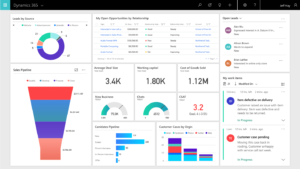What are the Benefits of Microsoft CRM 365 for Businesses?

It simply means that Microsoft CRM 365 is a helpful instrument in customer management since it provides several benefits to related companies, such as making their processes more accessible. A good CRM solution has several advantages, from better customer interactions to streamlining specific internal procedures.
This is where Microsoft CRM comes in: its powerful platform aims to streamline customer management, sales, marketing, and customer service. It brings all these capabilities into a single cohesive system in which companies can drive efficiency, gain insight, and ensure better outcomes. Knowing the benefits of Microsoft CRM 365 will help shed light on how firms can strive to use it best to improve their performance and deliver strategic leverage.
Improved customer relationships:
A Microsoft CRM 365 system provides a single platform for tracking information and history, allowing organizations to maintain proper records of customer interactions, preferences, and feedback.
With this holistic view, companies could offer personalized communication, anticipate their needs, and provide better service. By developing closer relationships with personalized and informed interactions, customers will be satisfied, eventually creating loyal customers.
Improved Sales Performance:
Due to better lead management and sales tracking, Microsoft CRM 365 systems support tools that improve selling performance. All sales teams can manage their pipelines, track opportunities in the lineup, and accurately forecast sales. Integrated features allow sales professionals to concentrate efforts, work better with others, and simplify processes. This leads to greater productivity and better deal closure results.
Smoothing of marketing efforts:
A Microsoft CRM 365 solution can make marketing much more accessible by automating and managing campaigns more effectively. Businesses can design and execute email marketing campaigns with one system, segment audiences, and measure their effectiveness. Automated workflows help fine-tune marketing strategies for better ROI using analytics tools, making it easy to reach the right audience.
Efficient Customer Service:
Microsoft CRM 365 systems will support effective customer service through their features like case management and the knowledge base. Both can address general customer inquiries, track service requests, or resolve issues more efficiently. Automating workflows and maintaining records of interactions about services could significantly enhance response times and quality of service, therefore enhancing general customer satisfaction.
Improved efficiency and productivity:
Microsoft CRM 365 enhances efficiency and productivity by automating routine activities. Examples include data entry, follow-up reminders, and reporting. Such automation reduces manual effort and minimizes errors, enabling employees to focus on higher-value activities.
The CRM system’s intuitive interface and robust workflow management system tools ensure a streamlined process that enables sales and customer service teams to work more effectively. Besides, real-time access to data and analytics informs decision-making.
A structure such as this greatly aids the speed at which businesses can respond to changes in markets and operational challenges to drive better efficiencies, outcomes, and company growth.
Data-Driven Insights:
Aggregating data from various sources, the platform provides access to analytics and reporting functionality that will enable performance metric tracking. The customizable dashboards will present businesses with visualization of trends, monitoring KPIs, and better decision-making abilities using real-time data. This functionality encourages better strategic planning and points out opportunities that may exist yet have not been noticed for more growth and development.
Smoothened Customer Service:
Microsoft CRM 365 helps smooth customer service processes by providing tools for tracking and managing requests and support capabilities such as case management, automatic ticketing systems, and knowledge. This allows allowing support teams to fix issues more efficiently.
Automating workflows and SLAs ensures timely responses and uniform quality of service. CRM enhances service delivery and satisfaction by organizing and prioritizing customer inquiries. This ensures faster throughputs to resolution and a far better overall experience for the customer.
Conclusion:
Companies can earn big dividends using the Microsoft365 system: better customer relationships, improved sales, smoother avenues to effective marketing, quick customer service, and data-driven insight.
Combining these functions into one place creates better enterprise effectiveness for the company and, thus, better results. A full-cycle CRM solution, also known as the future of technology, helps companies manage customer interactions for better growth and a competitive advantage.




